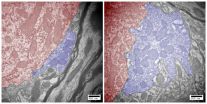(Press-News.org) After gobbling the fourth Oreo in a row while bathed in refrigerator light, have you ever thought, "That wasn't enough," and then proceeded to search for something more?
Researchers at BYU have shed new light on why you, your friends, neighbors and most everyone you know tend to snack at night: some areas of the brain don't get the same "food high" in the evening.
In a newly published study, exercise sciences professors and a neuroscientist at BYU used MRI to measure how people's brains respond to high- and low-calorie food images at different times of the day. The results showed that images of food, especially high-calorie food, can generate spikes in brain activity, but those neural responses are lower in the evening.
"You might over-consume at night because food is not as rewarding, at least visually at that time of day," said lead author Travis Masterson. "It may not be as satisfying to eat at night so you eat more to try to get satisfied."
The study, which appears in academic journal Brain Imaging and Behavior, also reports that participants were subjectively more preoccupied with food at night even though their hunger and "fullness" levels were similar to other times of the day.
Masterson, who carried out the research for his master's thesis under faculty advisor James LeCheminant, said the intent was to better understand if time of day influences neural responses to pictures of food.
The researchers teamed up with BYU neuroscientist Brock Kirwan to use functional MRI to monitor the brain activity of study subjects while they viewed images of food. The participants viewed 360 images during two separate sessions held one week apart--one during morning hours and one during evening hours.
Subjects looked at images of both low-calorie foods (vegetables, fruits, fish, grains) and high-calorie foods (candy, baked goods, ice cream, fast food). As expected, the researchers found greater neural responses to images of high-calorie foods. However, they were surprised to see lower reward-related brain reactivity to the food images in the evening.
"We thought the responses would be greater at night because we tend to over-consume later in the day," said study coauthor Lance Davidson, a professor of exercise sciences. "But just to know that the brain responds differently at different times of day could have implications for eating."
Nevertheless, researchers noted that the study is preliminary and additional work is needed to verify and better understand the findings. The next research steps would be to determine the extent that these neural responses translate into eating behavior and the implications for weight management.
Masterson, who is heading to Penn State University to work on his PhD in the fall, said the study has helped him pay better attention to how food makes him feel both in the morning and the evening. And as for his late-night eating habits?
"I tell myself, this isn't probably as satisfying as it should be," he said. "It helps me avoid snacking too much at night."
INFORMATION:
Anxiety disorders affect approximately one in six adult Americans, according to the National Institute of Mental Health. The most well-known of these include panic disorder, post-traumatic stress disorder, obsessive-compulsive disorder, and social anxiety disorder. But what of brief bouts of anxiety caused by stressful social situations?
A new study by Tel Aviv University researchers, published recently in the Journal of Oral Rehabilitation, finds that anxiety experienced in social circumstances elevates the risk of bruxism - teeth grinding which causes tooth wear and ...
BUFFALO, N.Y. -- Cells that relay information from the ear to the brain can change in significant ways in response to the noise level in the environment.
That's one major finding of a study out today in the Early Edition of the Proceedings of the National Academy of Sciences.
Expose the cells to loud sounds for a prolonged period of time, and they alter their behavior and even their structure in a manner that may aid hearing in the midst of noise. End the ruckus, and the cells change again to accommodate for quieter environs.
"The brain is amazingly adaptable: The ...
A multidisciplinary team of Johns Hopkins researchers has developed two new strategies to treat depression in young people using the selective serotonin reuptake inhibitor (SSRI) class of medications. These strategies, published May 5 in the journal Translational Psychiatry, incorporate a new understanding of how to mitigate the risk of suicide while on SSRI treatment.
"These medications have to be dosed in a careful way," says senior investigator Adam Kaplin, M.D., Ph.D., an assistant professor of psychiatry and neurology at the Johns Hopkins University School of Medicine. ...
(Winston-Salem, N.C. - May 5, 2015) - Researchers from Wake Forest University and the University of Utah are the first to successfully fabricate halide organic-inorganic hybrid perovskite field-effect transistors and measure their electrical characteristics at room temperature.
"We designed the structure of these field-effect transistors that allowed us to achieve electrostatic gating of these materials and determine directly their electrical properties," said lead author, Oana Jurchescu, an assistant professor of physics at Wake Forest. "Then we fabricated these transistors ...
HOUSTON -- ( May 5, 2015 ) -- The effectiveness of cancer vaccines could be dramatically boosted by first loading the cancer antigens into silicon microparticles, report scientists from Houston Methodist and two other institutions in an upcoming Cell Reports (early online).
Model studies showed that microparticles loaded with an antigen, HER2, not only protected the antigen from premature destruction, but also stimulated the immune system to recognize and relentlessly attack cancer cells overexpressing the HER2 antigen.
"We could completely inhibit tumor growth after ...
An intervention to connect low-income uninsured and Medicaid patients to a reliable source of primary health care shows promise for reducing avoidable use of hospital emergency departments in Maryland. A University of Maryland School of Public Health study evaluating the results of the intervention was published this week in the May issue of the journal Health Affairs.
For twenty years, use of hospital emergency departments has been on the rise in the United States, particularly among low-income patients who face barriers to accessing health care outside of hospitals ...
The rainfall accumulation analysis above was computed from data generated by the Integrated Multi-satellite Retrievals for GPM (IMERG) during the period from April 28 to May 3, 2015. During this period IMERG algorithms continuously merged and interpolated satellite passive microwave precipitation estimates and microwave-calibrated infrared (IR) satellite estimates over the entire globe.
Rainfall from cyclone Quang fell over the west coast and a non-tropical system pounded the east coast of Australia simultaneously during the past weekend. Cyclone Quang formed in the South ...
A pilot study has found that participating in a nine-week training program including elicitation of the relaxation response had a significant impact on clinical symptoms of the gastrointestinal disorders irritable bowel syndrome and inflammatory bowel disease and on the expression of genes related to inflammation and the body's response to stress. The report from investigators at the Benson-Henry Institute at Massachusetts General Hospital (MGH) and at Beth Israel Deaconess Medical Center (BIDMC), published in the open-access journal PLOS ONE, is the first to study the ...
Out loud, someone says, "The man is catching a fish." The same person then takes pen to paper and writes, "The men is catches a fish."
Although the human ability to write evolved from our ability to speak, writing and talking are now such independent systems in the brain that someone who can't write a grammatically correct sentence may be able say it aloud flawlessly, discovered a team led by Johns Hopkins University cognitive scientist Brenda Rapp.
In a paper published this week in the journal Psychological Science, Rapp's team found it's possible to damage the speaking ...
Environmental factors similar to those affecting the present day Great Barrier Reef have been linked to a major slowdown in its growth eight thousand years ago, research led by the University of Sydney, Australia shows.
"Poor water quality, increased sediments and nutrients - conditions increasingly being faced by the modern day reef - caused a delay in the Reef's growth of between seven hundred and two thousand years duration," said Belinda Dechnik, from the University of Sydney's School of Geosciences and lead author of an article published in Marine Geology in May. ...





